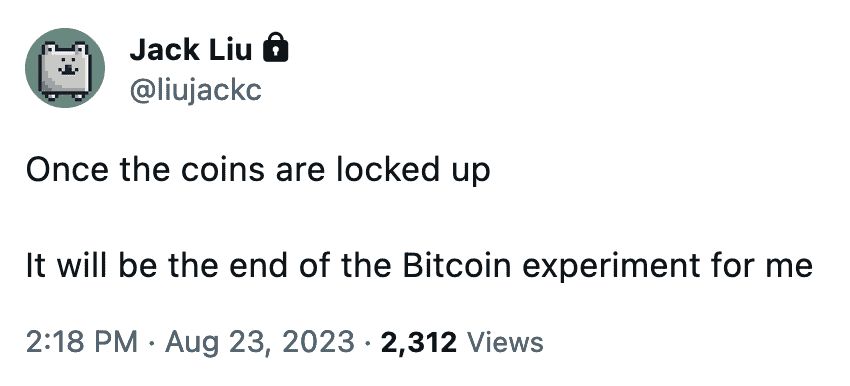|
Getting your Trinity Audio player ready...
|
Bitcoin entrepreneur Jack Liu is back on the BSV blockchain with another innovation. It could be his last Bitcoin project ever.
Maybe.
Liu wants to enable locking up Bitcoin for years or even decades. We know about nLockTime as a core functionality in Bitcoin. CoinGeek’s Joshua Henslee presented a tutorial to utilize nLockTime in accordance with what Dr. Craig Wright said in one of his articles.

However, Liu is not aiming for a simple nLockTime transaction to be broadcasted in the future, but something else. Something more severe. Really locking up your Bitcoin for a set time, without being able to spend it earlier or retreating from the lock-up.
The technical details of this “solution” are yet to be published and could involve results similar to what Bitcoin developer David Case has put out on Github already. It is safe to assume that Liu and his team will enable that kind of locking mechanism in a more user-friendly way, as in making it fun to lock BSV up.
Why is this interesting? HODL on steroids, or a deeper thought?
I have been following the recent discussions in the X spaces involving Jack Liu and his associates. Their dedication to the concept of “HODLing” their coins with unwavering resolve, resisting any temptation to spend these satoshis for an extended period, was evident in each of their gatherings.
However, there is another facet to their approach. Liu and his team are strategizing to streamline the process of locking up coins and displaying the outcomes through a publicly accessible leaderboard. Picture a platform akin to X (formerly Twitter), but with the added feature of revealing the quantity of BSV an individual has committed to lock up for a designated duration. This display can either be associated with your true identity if privacy is not a concern or under a pseudonym.
Such a system could facilitate better contextual understanding during online interactions. Liu has expressed his interest in gauging whether the online pseudonymous entities he engages with have BSV locked up in their possession.
Specifically, he seeks to engage solely with individuals who genuinely possess BSV holdings, individuals who have gone beyond the transient act of momentarily storing coins in their wallets for immediate usage and instead exhibit a resolute “commitment” to the network by locking up their coins.
HODL on an extreme level, so to speak—but with another purpose instead of simply waiting for price appreciation. While I may not align with all aspects of this ideology, it is worth mentioning.
Some kind of digital republic? Now it gets spicy!
When I heard of this concept, I thought of how, in the late 1700s, one of the U.S. constitutions enabled voting, but only for landowners.
For example, the Massachusetts Constitution of 1780 stated:
“(…) inhabitant of twenty-one years of age and upwards, having a freehold estate within the commonwealth, of the annual income of three pounds, or any estate of the value of sixty pounds, shall have a right to give in his vote for the senators (…)
Indeed, the United States has evolved from a historical context of what was once referred to as some kind of “sophisticated voting rights,” which has now been recognized as discriminatory.
Liu, however, appears to be aligning his perspective in that same vein. From what I have heard in the various X spaces by him and his team, they do not seek to only speak to wealthy BSVers, but to people that own BSV and lock them up; Even if it is just 1 BSV.
As of writing this, it means locking up roughly US$30—but in BSV—on the BSV blockchain. As crazy as this sounds, it enables users to filter out people. Before you judge, let me assure you that you probably do the same unconsciously anyway in your daily life.
Consider, for instance, how businesses tend to allocate more attention to their higher-end clientele. Likewise, as individuals, we naturally gravitate towards those who exhibit a degree of stability and purpose. As a business owner, would you not prioritize your interactions with customers of higher financial standing? Similarly, on a personal level, do you find comfort in the company of individuals who have “nothing to lose” in life?
Or do you prefer people who at least have a job or strive to find one, who are integrated in a family, who have a direction, a goal, and just anything that enables you to feel safe in their company?
Hype means something is cooking—BSV does not have to be boring!
Liu tries to bring this into the digital realm. For example, on X, we basically only have one filter—the “blue checkmark” verification. It’s not an amazing technique if you ask me.
Imagine someone creates an X-like social media network on the BSV blockchain that shows how much BSV your alias/account name has locked up for 30 years—even 0.1 BSV would be sufficient to signal whatever that signal may mean to you personally. At least it is not made up, as it literally is engraved on the BSV blockchain.
If you can summon hype, I give you 1 or 2 minutes of my attention:
https://twitter.com/_JustCory_/status/1695904899433689427
https://twitter.com/captainord50913/status/1695535640836730909
https://twitter.com/shy_umbrella2/status/1694811223500652643
Enough with the ‘lunatic stuff’! What does Satoshi Nakamoto say about nLockTime?
While the reader digests the above, we may have a look at what Bitcoin inventor Dr. Craig Wright thinks of nLockTime. In his article, Locked Transactions for Planning, Dr. Wright stated:
Bob sets up a transaction that uses a lock time to keep the transaction off the blockchain, he will have managed to construct something that takes the money out of existence and allows it to come back only when Alice is 18.
Legally speaking, he has created a trust that takes control of the money away from himself and gives it to Alice in such a way that she will obtain control when she is 18 — but not before.
In a recent Bitcoin Masterclasses, Dr. Wright said concerning BSV blockchain-powered contracts:
If I have an nLockTime transaction on that conditional, but I spend the source before the nLockTime becomes due – what happens? It is invalidated, isn’t it? It is a double spend now, so if I’ve spent the input then that promise that isn’t on chain has never been valid.
It’s like in a quantum state: it is potentially valid, it is only when you look in the box and suddenly the cat is not dead, or dead.
Wait, a transactional trust? BSV satoshis in a quantum state? Fascinating for sure!
While Dr. Wright focuses more on the serious applications of nLockTime transactions, Liu is in a hallucinated wedding dance with it. I say: educate yourself with Dr. Craig Wright’s lectures on nLockTime and still have an open ear for unconventional experiments from Jack Liu.
Jack Liu: Just by living, you’re going to be making Bitcoin transactions

 02-22-2026
02-22-2026 




